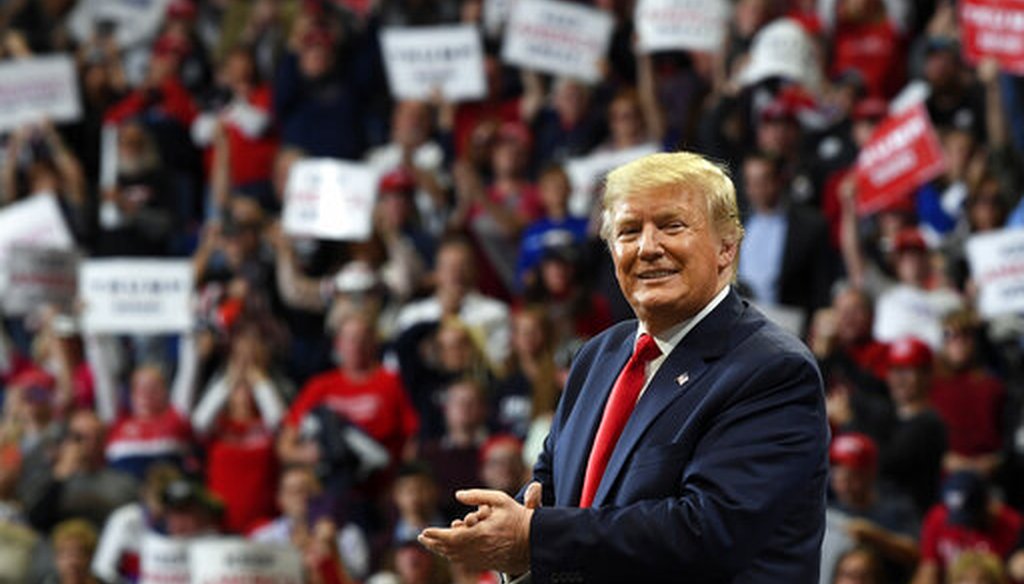Stand up for the facts!
Our only agenda is to publish the truth so you can be an informed participant in democracy.
We need your help.
I would like to contribute

President Donald Trump speaks during a campaign event in Lexington, Ky., on Nov. 4, 2019. (AP)
Could President Donald Trump be impeached, removed from office and then run again for president in 2020?
A reader recently asked us this question, and we were intrigued.
The short answer, we found, is that Trump probably could run again, as long as the Senate didn’t decide to forbid it. But it wouldn’t be easy.
The explanation gets complicated, so let’s take a step-by-step look.
What does the Constitution say?
The Constitution is quite clear about what the Senate can do when presented with a House-approved impeachment, in Article I, Section 3, Clause 7:
"Judgment in Cases of Impeachment shall not extend further than to removal from Office, and disqualification to hold and enjoy any Office of honor, Trust or Profit under the United States."
In other words, the Senate can vote to remove the president and to disqualify him or her from holding future office.
Could the Senate choose what punishment to apply?
Scholars suggest that the Senate has the power to support removal from office without barring them from holding office in the future.
"It is up to the Senate to make that decision," said Stephen M, Griffin, a Tulane University law professor.
There’s even a well-known example of a Phoenix-like rebirth: The Senate removed Alcee Hastings from his judgeship in 1989, but he later won election to the U.S. House, where he continues to serve.
How many votes would be needed?
What’s less clear is the process by which any of this would happen, and the extent to which past precedents would matter.
For instance, "there would be an argument over whether separate votes are required," Griffin said.
However, there is precedent for separate votes, Michael J. Gerhardt, a constitutional law professor at the University of North Carolina, has written.
"In 1862 and 1913, the Senate took separate votes to remove and disqualify judges West Humphreys and Robert Archbald, respectively," Gerhardt wrote. "For each judge, a supermajority first voted to convict, followed by a simple majority vote to disqualify. The Senate defended this practice on the ground that the clause mentioning disqualification does not specify the requisite vote for its imposition."
The House’s wishes could matter
The wording of the House’s articles of impeachment may carry some weight, either officially or unofficially.
The articles of impeachment approved by the House Judiciary Committee against President Richard Nixon in 1974 (and made moot by Nixon’s subsequent resignation) specified only that Nixon "warrants impeachment and trial, and removal from office."
By contrast, the 1998 impeachment articles against President Bill Clinton said that he "warrants impeachment and trial, and removal from office and disqualification to hold and enjoy any office of honor, trust, or profit under the United States" – a broader punishment that, if it had been approved by the Senate, would have precluded Clinton from running for office in the future.
How could Trump go about running again for president after being removed from office?
Let’s imagine that the House impeaches Trump and, while this is considered a longshot from today’s perspective, two-thirds of the Senate votes to remove the president. Let’s also say that the Senate, for whatever reason, does not specify that Trump is barred from holding public office in the future.
In this scenario, Vice President Mike Pence would become president, but Trump could still run for another term in 2020, with or without Pence’s agreement.
The timing of the current impeachment process raises complications. But the Republican Party’s current nomination process gives Trump an edge, experts say, even if he’s impeached and removed from office.
The GOP nomination process in 2020 "is quite closed, in order to insulate the incumbent, President Trump," said Josh Putnam, a political scientist who runs the site FrontloadingHQ about delegate selection rules. Changes the party made in 2016 require delegates to be bound to support their candidate at the convention, he noted.
So if Trump’s removal from office occurred after the early primaries, Putnam said, "ballot access becomes a nightmare for any alternative candidate to a hypothetical former President Trump. It would be too late in most cases. The result is that primary season may be locked in for Trump already."
If Trump’s popularity following his removal truly cratered within the party, the party would have a path to moving toward a different candidate, though a tricky one.
A majority of delegates at the convention would have to support an effort to unbind the delegates from the candidates they’re pledged to. Then, a plurality of delegates in at least five states would have to line up behind an alternative to get that candidate placed in nomination for the roll call vote.
Putnam said this scenario could "get quite messy quite quickly." DePaul University political scientist Wayne P. Steger agreed.
"There’s a tiny probability that Trump’s support collapses by next June, and he is impeached and renominated," Steger said. "Would convention delegates continue to support him under those conditions? I’m not sure."
A final note: Whether Trump is removed or not, he would only be able to be elected for one more four-year term. The 22nd Amendment says that "no person shall be elected to the office of the President more than twice."
Our Sources
U.S. House of Representatives, impeachment report, 1974
Congress.gov, impeachment report, 1998
New York Times, "The Articles of Impeachment Against Donald J. Trump: A Draft," June 5, 2019
Legal Information Institute, "The Nixon Impeachment Proceedings," accessed Nov. 5, 2019
Heritage Foundation, "Punishment for Impeachment," accessed Nov. 5, 2019
Edward B. Foley, "Congress Should Remove Trump from Office, But Let Him Run Again in 2020," Sept. 25, 2019
Email interview with Philip Bobbitt, law professor at Columbia University, Nov. 4, 2019
Email interview with Frank O. Bowman III, law professor at the University of Missouri, Nov. 5, 2019
Email interview with Allan Lichtman, American University political scientist, Nov. 4, 2019
Email interview with Michael J. Gerhardt, constitutional law professor at the University of North Carolina, Nov. 4, 2019
Email interview with Josh Putnam, political scientist who is a leading expert on delegate selection rules, Nov. 5, 2019
Email interview with Jeffrey A. Engel, director of the Center for Presidential History at Southern Methodist University, Nov. 4, 2019
Email interview with Stephen M, Griffin, Tulane University law professor, Nov. 4, 2019
Email interview with Wayne P. Steger, DePaul University political scientist, Nov. 4, 2019




































